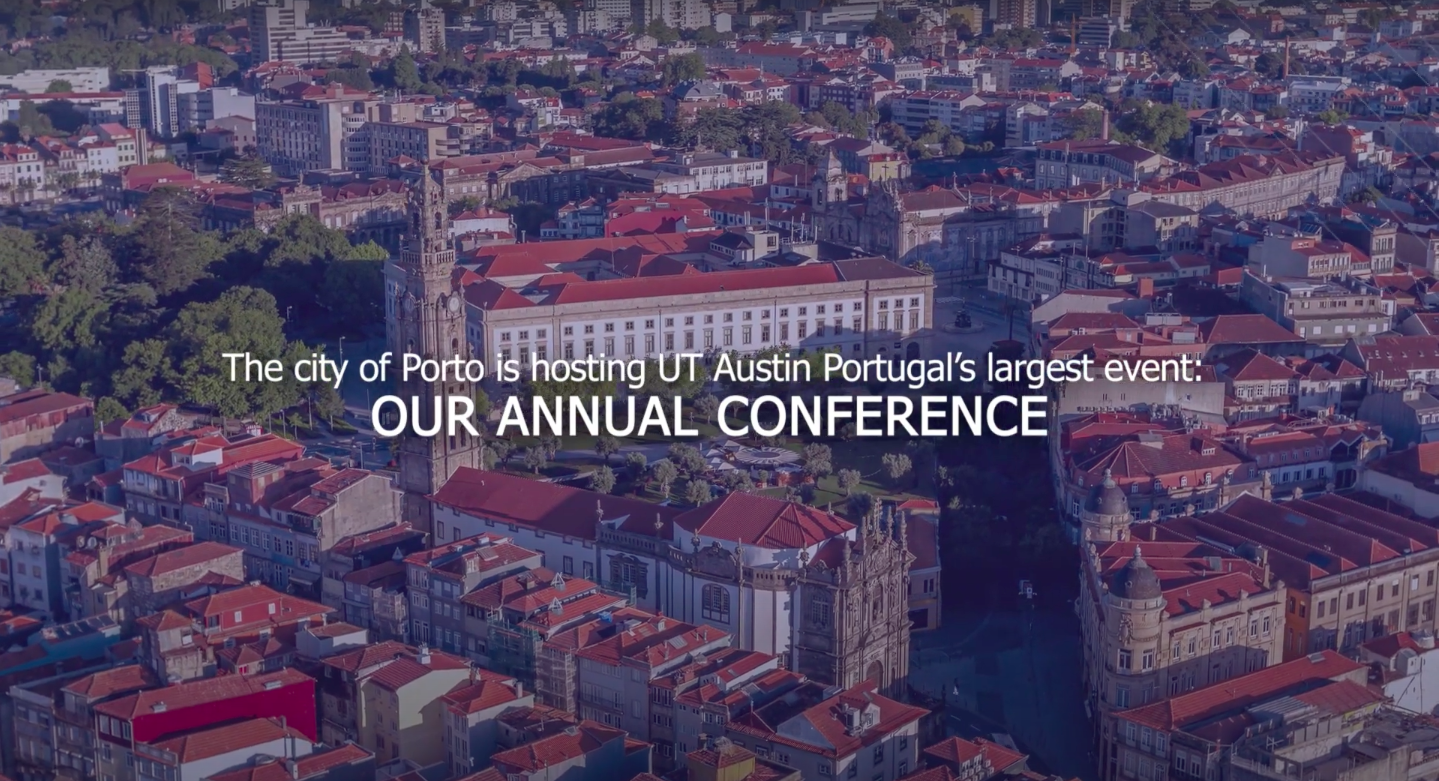Conference UTAUstin Portugal (original) (raw)
We are coming back in October 2022!
The UT Austin Portugal Program Annual Conference is the Program’s largest knowledge-sharing and networking event that intends to mobilize its community together with world-class speakers across academia and industry from the Partnership’s geographical scope and beyond.
Our previous edition focused on “Connecting the dots: interdisciplinarity as a way to build up resilience”, where we discussed how interdisciplinarity in science is helping societies become more resilient.
The Program’s largest transatlantic event is coming back in October 2022, this time to the Porto Cruise Terminal in Matosinhos, where our community will be discussing International S&T Partnerships as Platforms of Science Diplomacy.
Check out our website for the latest updates on the most anticipated event of our Program.
2021 Sessions & Activities
![]()
Warm-up Sessions
To get you in the Conference’s state of mind, two exclusive warm-up sessions on Science Commercialization and Communication.
Warm-up Sessions
![]()
Fireside Chat
Watch a captivating conversation with a mathematical epidemiologist who navigates interdisciplinarity to fight diseases and improve public health.
Fireside Chat
![]()
Roundtables
Two roundtables with experts from academia, research agencies and industry to shed light on the integrative nature of Nanotechnologies and Health.
Roundtables
![]()
Masterclasses
Register for exclusive thematic masterclasses covering the full range of the Program’s Areas!
Masterclasses
![]()
e-Poster Virtual Gallery
A virtual poster gallery showcasing relevant research work across the five areas forming the Program’s knowledge base.
e-Poster Virtual Gallery
![]()
Cooperation Profiles
Find out who is going to the Conference, let your peers know that you're also attending and grow your network.
Cooperation Profiles
2021 Agenda
October 18

Van Truskett
Texas Innovation Center, The University of Texas at Austin, USA
Moderated by: Marco Bravo (UT Austin Portugal Co-PI and Executive Director at UT Austin)
Exclusive online event, via Zoom, for a limited number of participants
Duration: 1 h
October 19

Júlio Borlido
i3S, Portugal
Moderated by: Catarina Carvalho (Head of Communications, UT Austin Portugal)
Exclusive online event, via Zoom, for a limited number of participants
Duration: 2 h
October 20
2.30 p.m. (GMT+1)
Opening Remarks
Hybrid
Speakers:
João Falcão e Cunha (FEUP)
José Manuel Mendonça (UT Austin Portugal)
John Ekerdt (UT Austin Portugal)
Helena Pereira (FCT)
Hybrid
Interview led by Elizabeth Fernandes, Data Strategy Manager at Público
Hybrid
Facilitated by Lars Montelius (INL)
Discussants:
Luís Graça (iMM, ImmuneNanoVac project)
Bruno Figueiredo (Graphenest, GEMIS project)
Alfredo Silva (Increase Time, NanoStim project)
Filipe Fernandes (University of Coimbra, MCTool21 project)
October 21
Hybrid
Facilitated by Miguel Coimbra (INESC TEC, FCUP)
Discussants:
Karol Lang (UT Austin, TOF-PET project)
Rui Sousa (Stemmatters, SENTINEL project)
Mireille Paulin (CNES, Tele-epidemiology)
Arlindo Oliveira (IST, Machine learning and pandemic monitoring)
Hybrid
Speaker::
John D. Davis (BSC-CNS, Barcelona Supercomputing Center)
Virtual
Speakers:
Brígida Ferreira (University of Lisbon)
Radhe Mohan (MDACC, MD Anderson Cancer Center)
Cátia Pedro (IPO Lisboa)
João Seco (DKFZ, German Cancer Research Center)
Virtual
Speakers:
Guihua Yu (UT Austin)
Maria Helena Braga (FEUP)
Arumugam Manthiram (UT Austin)
Senentxu Lanceros-Mendez (University of Minho)
Virtual
Speakers:
Felix Janssen (HGF-MPG, Alfred Wegener Institute)
Ana Colaço (IMAR, University of the Azores)
Andrew Thurber (Oregon State University)
Bruce Howe (University of Hawaii at Mãnoa)
Laura Wallace (UT Austin, GNS Science)
Virtual
Speakers:
João Claro (INESC TEC, FEUP)
José Coelho Rodrigues (INESC TEC, FEUP)
Our Speakers, Moderators & Scientific Contributors in 2021
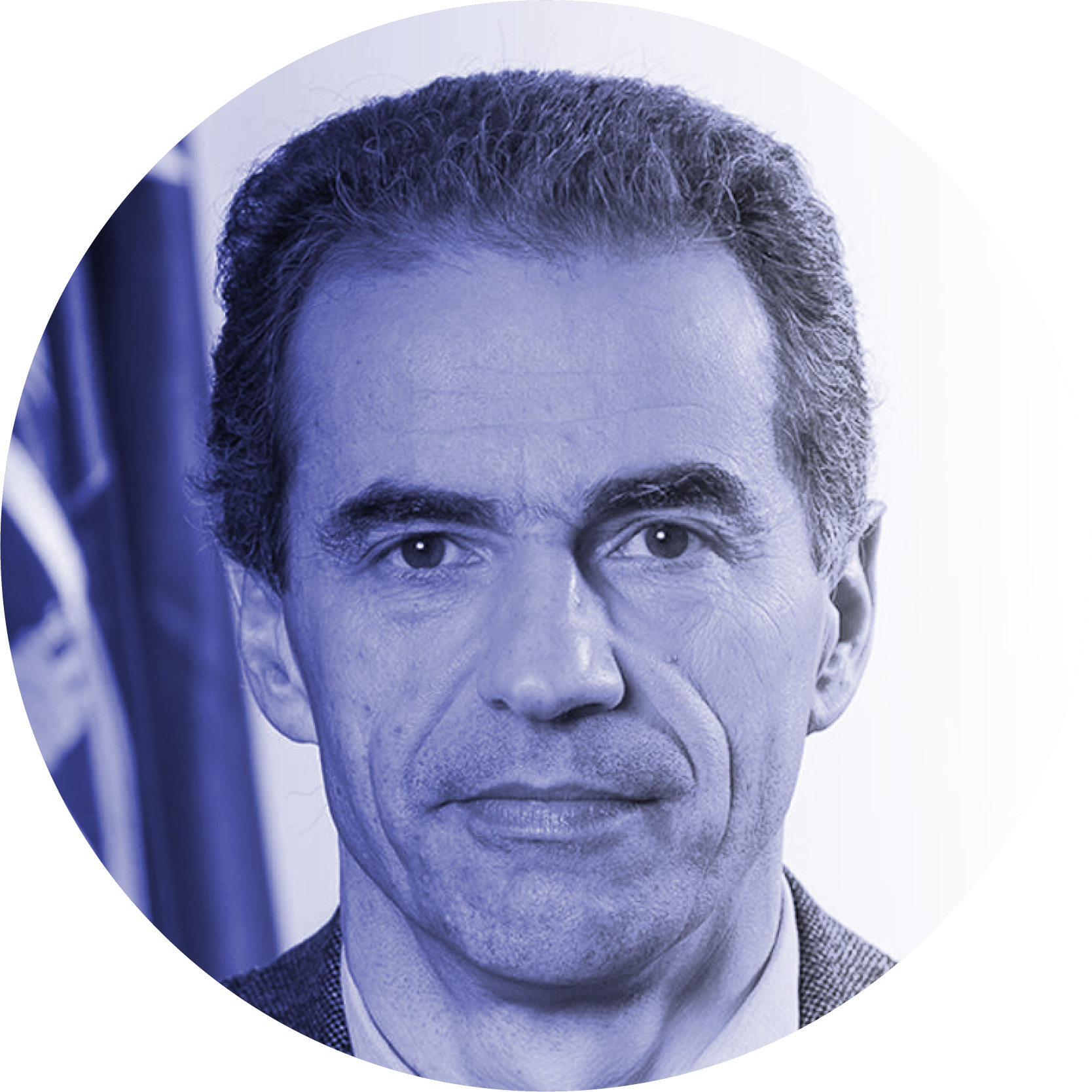
Manuel Heitor
Portuguese Minister of Science, Technology and Higher Education of the XXI Government.
Manuel Heitor

Alfredo Silva
Alfredo Silva has a Degree in Systems Engineering from the University of Minho, and a PMP certification by PMI. He has vast experience in project development and management, having participated in more than 15 European and national collaborative Research and Development projects in several areas (ICT, Energy, and Health, among others) five of which as project coordinator. These include projects such as BeingEnergy, COncORDE, TICE.Healthy, Symbiotic, and currently NanoStim. Previously, Alfredo worked for 10 years as a software developer, systems analyst, and technical team manager, having been responsible for the development of several digital systems.
Alfredo Silva
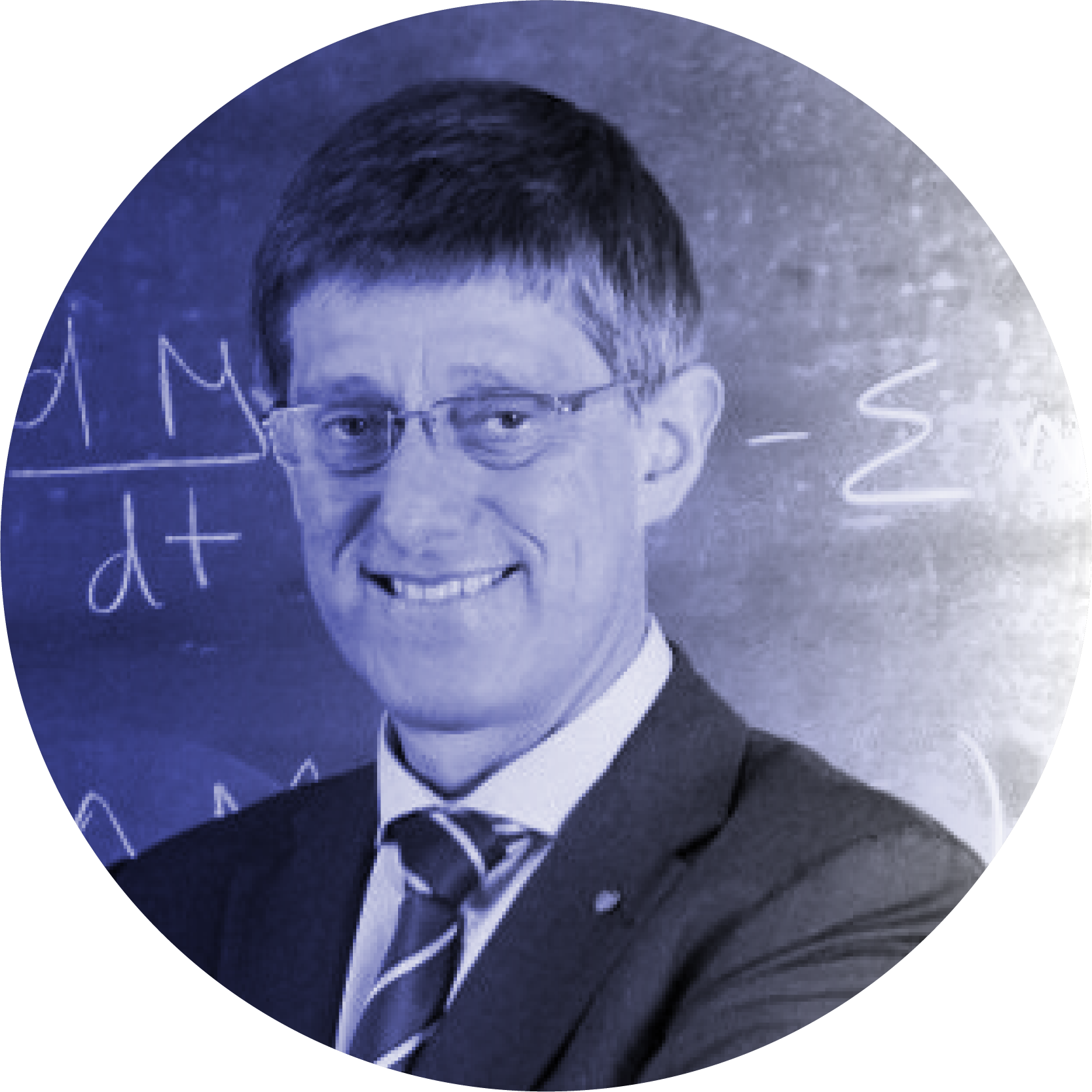
Arlindo Oliveira
Arlindo Oliveira is a Professor at the Department of Computer Science and Engineering at the Instituto Superior Técnico, President of INESC and Member of the Board of Caixa Geral de Depósitos. He is also a member of the Portuguese Academy of Engineering and a senior member of the Institute of Electrical and Electronics Engineers (IEEE). Arlindo has also worked at CERN, INESC-ID, and Cadence Laboratories. His main areas of interest include machine learning, algorithms and complexity, bioinformatics, and digital circuit design.
Arlindo Oliveira

Brígida Ferreira
Brigida Ferreira is an Assistant Professor at the Faculty of Sciences of of the University of Lisbon. She did her Ph.D. in Medical Radiation Physics at Karolinska Institutet and Stockholm University. The subject of her Ph.D. thesis was biological optimization of breast and cervix tumours. Her postdoc was done at the University of Aveiro and the Medical Physics Department of the IPOCFG aiming to implement IMRT for head and neck tumours and stereotactic IMRT for brain lesions. Her research work is published in several international journals. Some of her main interests are dose-response modelling, evaluation of the efficacy of radiation therapy and radiobiological optimization.
Brígida Ferreira

Carla Silva
UT Austin Portugal’s Area Director for Nanotechnologies (PT)
Carla Silva is the Director of the Department of Chemistry and Biotechnology at the Technological Centre for the Textile and Clothing Industry of Portugal (CITEVE), Portugal. She graduated in Biological Engineering at the University of Minho in 1996 and started working as a superior technician at the CITEVE. Later, she attained her Masters in Industrial Biotechnology at S. Paulo University and in 2005 she finished her Ph.D. in Textile Chemistry at the University of Minho. Since 2007 she has been working as a senior researcher in Centre for Nanotechnology and Smart Materials (CENTI) and is currently the Chief Technology Officer for that institution.
Carla Silva
UT Austin Portugal’s Area Director for Nanotechnologies (PT)
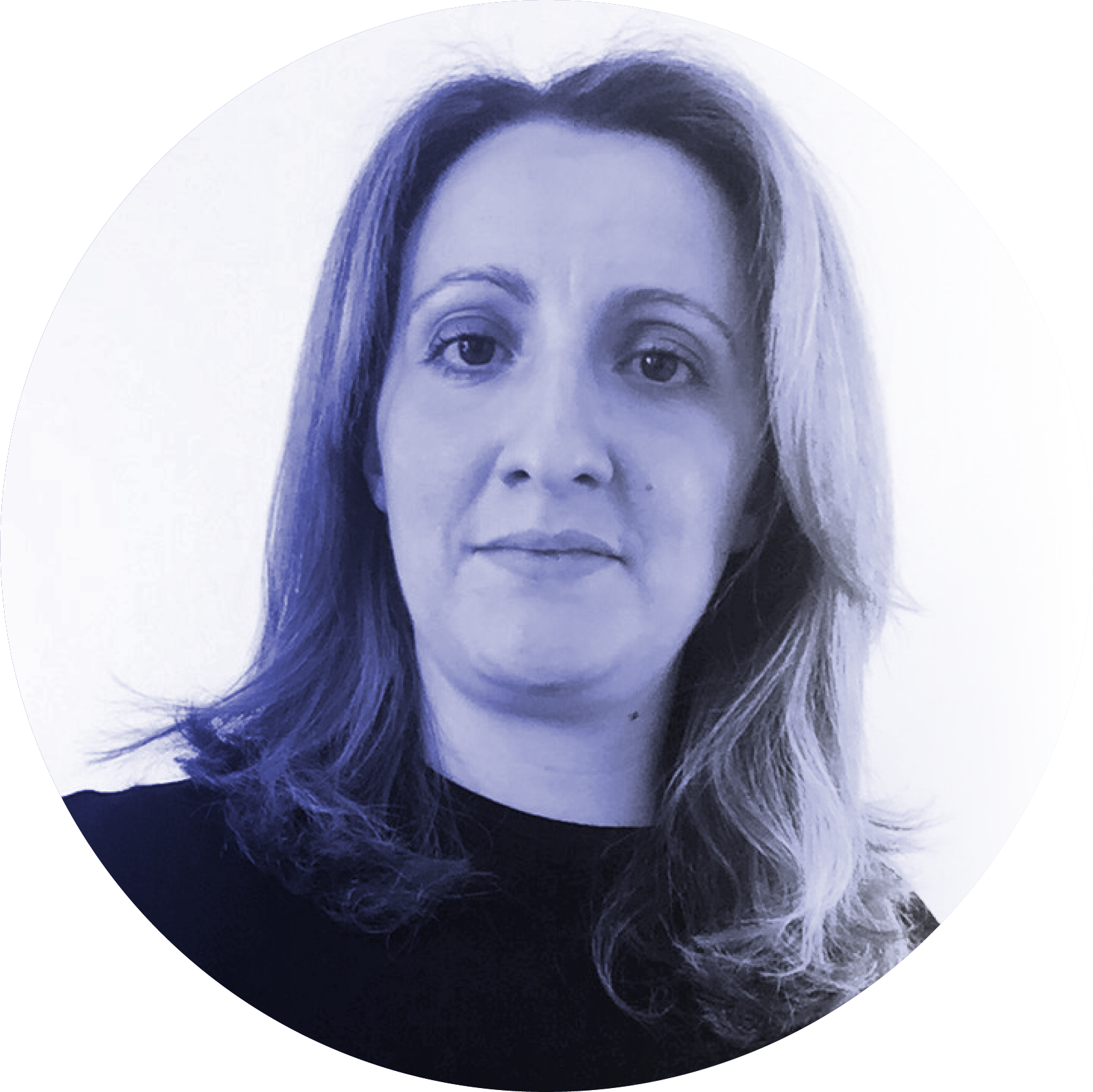
Elisabeth Fernandes
With an academic background covering biology, mathematics, statistics, data mining, business analytics and management, Elisabeth Fernandes started her career in a research project developing advanced algorithms (in R) to find trends, patterns, and events in biochemistry data. In 2015, she joined Público Media & News, being challenged two years later to create the analytics department and lead the organization’s data strategy. By combining communication strategies and strong relationships with stakeholders, Elisabeth started to build a more data-driven culture. Her team supports all departments turning data into information, information into insights and insights into business decisions.
Elisabeth Fernandes

Guihua Yu
Guihua Yu earned his Ph.D. degree in Chemistry from Harvard University in 2009, after graduating from the University of Science and Technology of China in Chemistry in 2003. With three years' postdoctoral research at Stanford University, Yu joined the faculty of Mechanical Engineering at the University of Texas at Austin as an assistant professor of Materials Science. Yu's research has been centered on rational design and synthesis of functional nanomaterials, fundamental understanding of their chemical and physical properties, and development of large-scale assembly and integration strategies to enable their technologically important applications in energy, environment, and sustainability technologies.
Guihua Yu
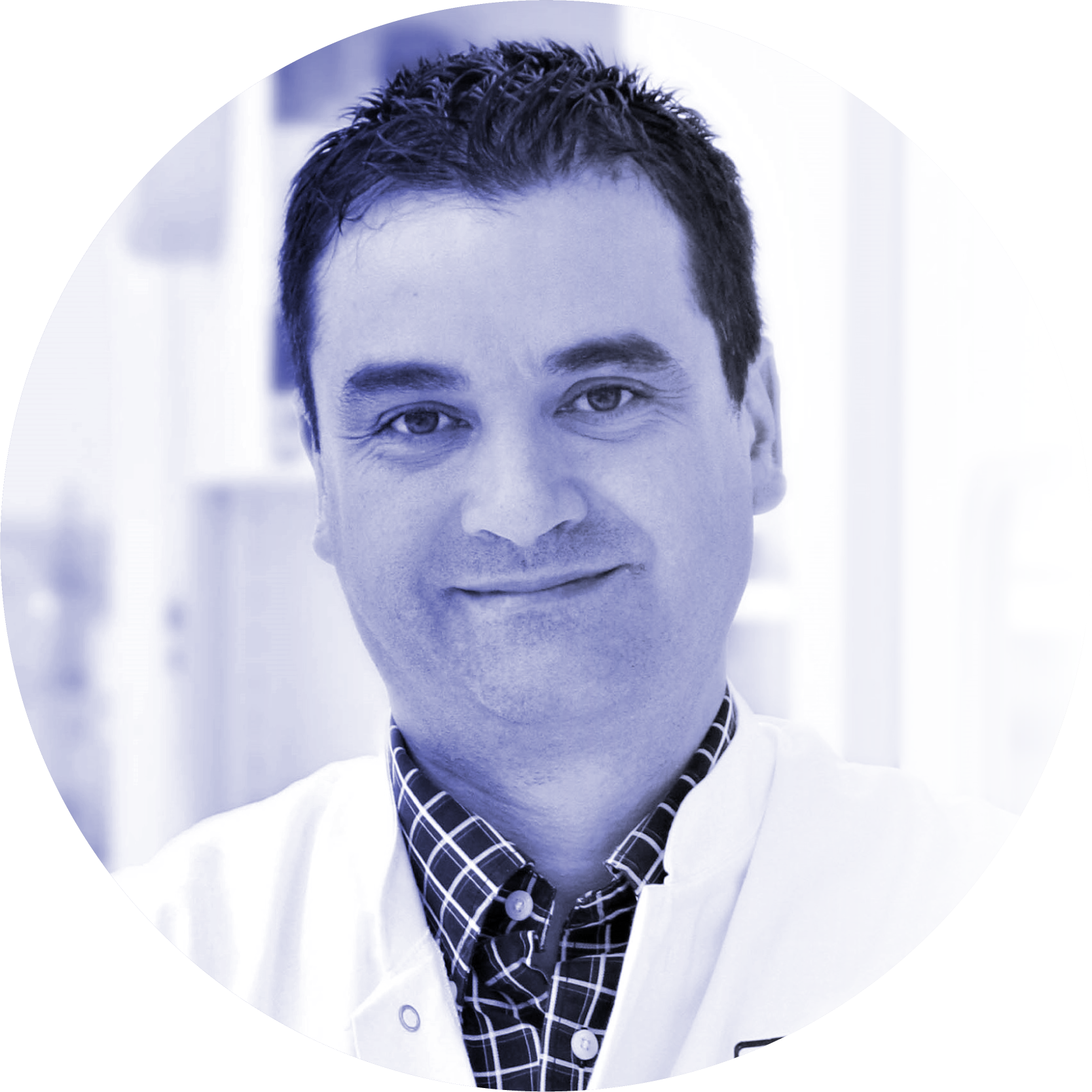
João Seco
João Seco is the Department Head of Biomedical Physics in Radiation Oncology at DKFZ (German Cancer Research Center). Seco graduated with a Ph.D. from the University of London, the Institute of Cancer Research and Royal Marsden Hospital. He then went on to become an Assistant Professor of Radiation Oncology at Harvard Medical School in Boston, working at the Massachusetts General Hospital. After that, he started to work at DKFZ. Presently, he is also the Chair of Medical Physics at Heidelberg University and is a member of the EFOMP Scientific Committee, representing the DGMP, German Society for Medical Physics.
João Seco
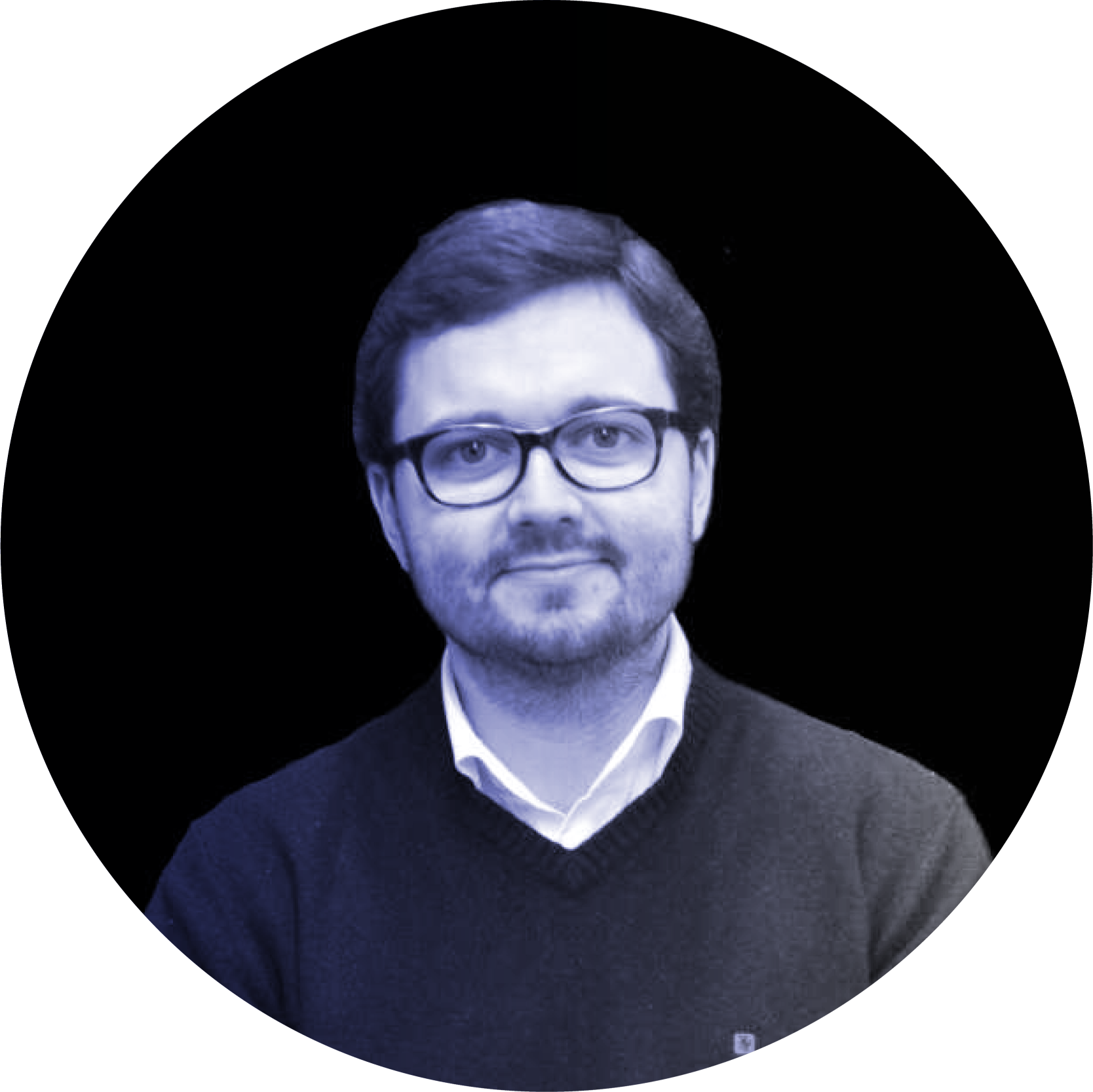
José Coelho Rodrigues
José Coelho Rodrigues holds a Ph.D. in Industrial Engineering and Management, with a specialization in Technology Management and a Master's in Electrical and Computers Engineering, with a specialization in Optimisation, both from the University of Porto (UPorto). He is currently a researcher at INESC TEC and an invited Assistant Professor at UPorto. Rodrigues teaches Entrepreneurship courses and general introductory courses of Management to Engineering students, as well as Technology Management courses to Management students at UPorto. He has also been responsible for workshops about technology management in European projects and industry-oriented events.
José Coelho Rodrigues

Júlio Borlido
Júlio Borlido is a biologist and science communicator who works as the Communication Unit Coordinator of i3S. Throughout his career, he has worked as a Life Sciences researcher, school teacher, demonstrator at the University of Porto (UPorto), and led the Institute of Molecular and Cell Biology's Office for Science Communication. He is also a member of the General Council of Carolina Michaelis School group, Vice-president of i3S Council Ethics and Responsible Research, and a member of the Communication Council of UPorto.
Júlio Borlido

Laura Wallace
Laura Wallace holds a Ph.D. on Earth Sciences from the University of California. She uses geodetic methods to investigate deformation of the Earth’s crust at plate boundaries. She conducts research at various locations, including New Zealand, Papua New Guinea, Solomon Islands, and Japan. In 2002, Laura was the first to record slow slip events in New Zealand’s Hikurangi Margin subduction zone. Investigating slow slip events at subduction zones has remained central to her research ever since. In addition to being a research scientist at UTIG, Laura holds a joint position at GNS Science, New Zealand.
Laura Wallace
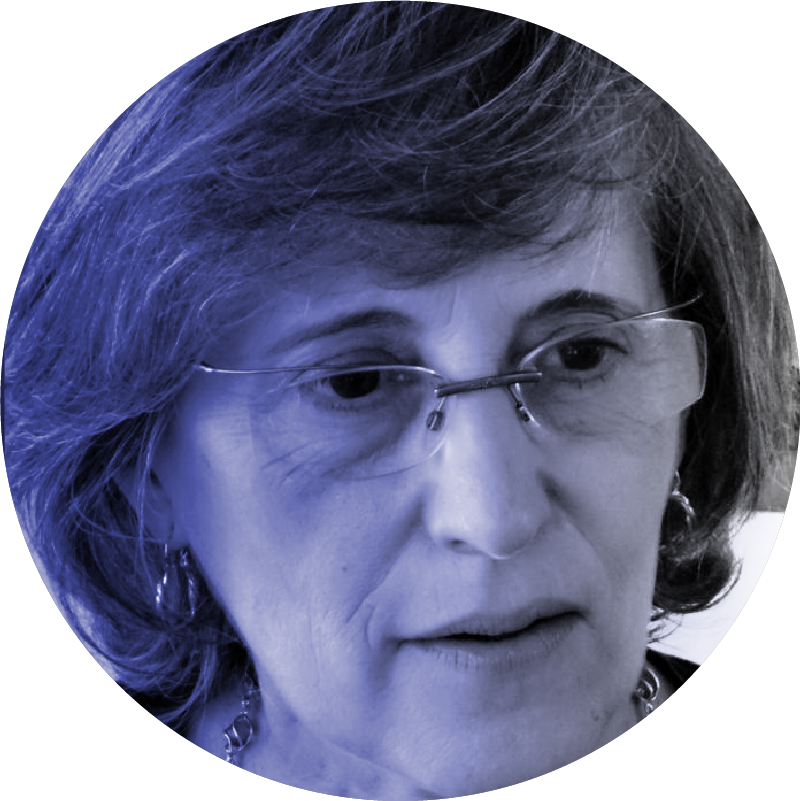
Luísa Bastos
UT Austin Portugal’s Area Director for Space-Earth Interactions (PT)
Luísa Bastos had her Ph.D. in Surveying Engineering from the Faculty of Sciences of the University of Porto, where she is currently a Principal Investigator. Since 1977, she is the Director of Prof. Manuel de Barros Astronomical Observatory, where she led the recovery of the largest telescope in Portugal.
Luísa Bastos
UT Austin Portugal’s Area Director for Space-Earth Interactions (PT)

Patrick Heimbach
UT Austin Portugal’s Area Director for Space-Earth Interactions (UT Austin)
Patrick Heimbach is an Associate Professor at The University of Texas at Austin with tenure in the Department of Geological Sciences and a member of the core faculty at the Institute for Computational Engineering and Sciences (ICES). He holds joint faculty appointments in the Jackson School of Geosciences and the Institute for Geophysics. At ICES, he is the fellow of the W. A. “Tex” Moncrief, Jr., endowed chair III in Simulation-Based Engineering and Sciences. He has worked for 16 years in MIT’s Department of Earth, Atmospheric and Planetary Sciences and is currently a Visiting Associate Professor.
Patrick Heimbach
UT Austin Portugal’s Area Director for Space-Earth Interactions (UT Austin)
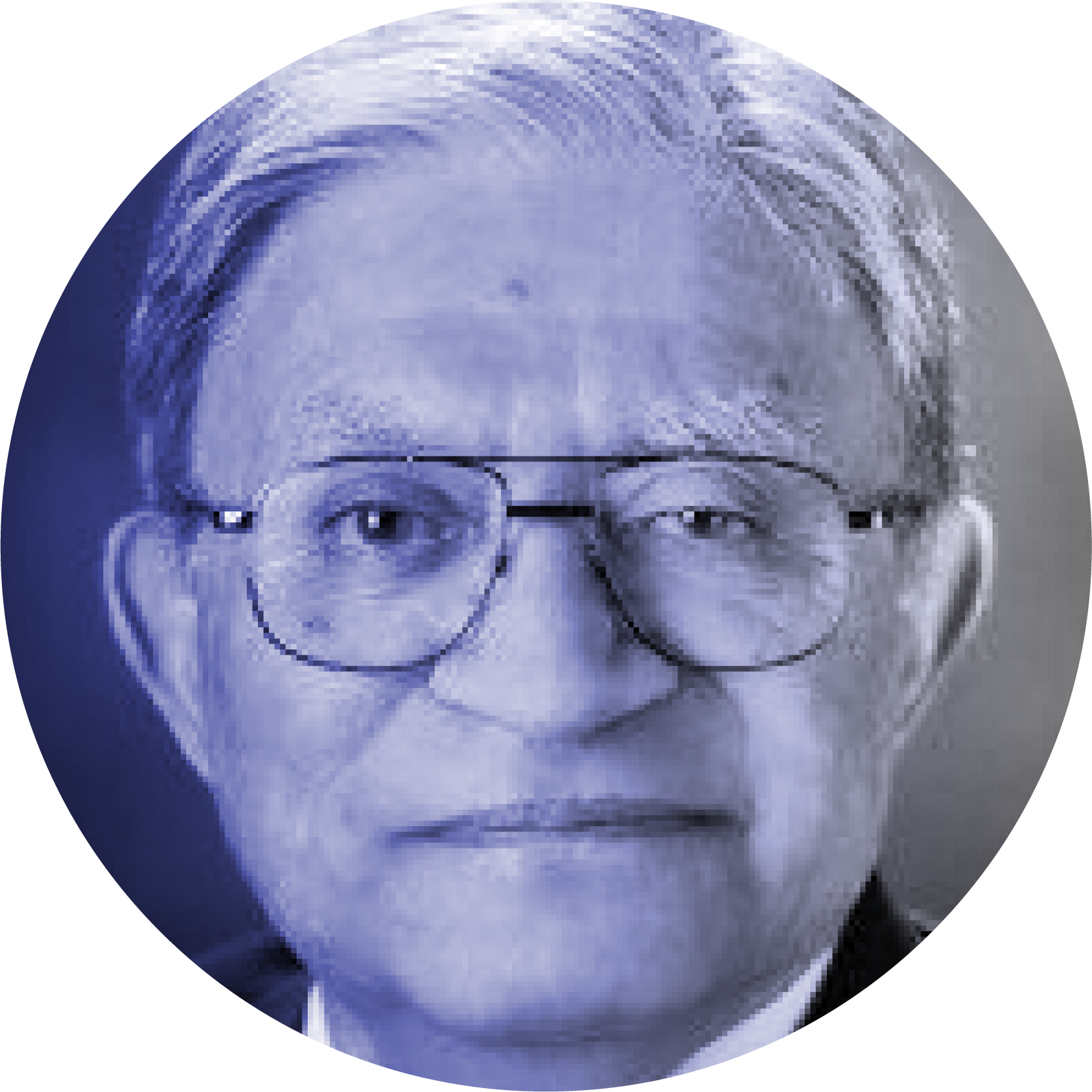
Radhe Mohan
Radhe Mohan has extensive experience in the field of radiation oncology physics including numerous pioneering contributions. Recently, his activities have been concentrated on various physical, clinical, and biological aspects of proton and light-ion therapy. Mohan is the Co-Principal Investigator (along with Thomas Delaney of Massachusetts General Hospital) of a Program Project grant entitled “Improving the Clinical Effectiveness and Understanding of the Biophysical Basis of Proton Therapy” from the National Cancer Institute. Mohan will be leading the AT@PT project and oversee the research progress in the coordination of the research team in Portugal.
Radhe Mohan

Senentxu Lanceros-Mendez
Senentxu Lanceros-Mendez graduated in physics at the University of the Basque Country, Leioa, Spain. He obtained his Ph.D. degree at the Institute of Physics of the Julius-Maximilians-Universität Würzburg, Germany. He was Research Scholar at Montana State University, Bozeman, USA and visiting scientist at the, Pennsylvania State University, USA and University of Potsdam, among others. He is Associate Professor at the Physics Department of the University of Minho, Portugal (on leave) and from 2012 to 2014 he was also Associate Researcher at the INL – International Iberian Nanotechnology Laboratory. Since 2016 he is Ikerbasque Professor at the BCMaterials, Basque Center for Materials, Applications and Nanostructures, Derio, Spain.
Senentxu Lanceros-Mendez
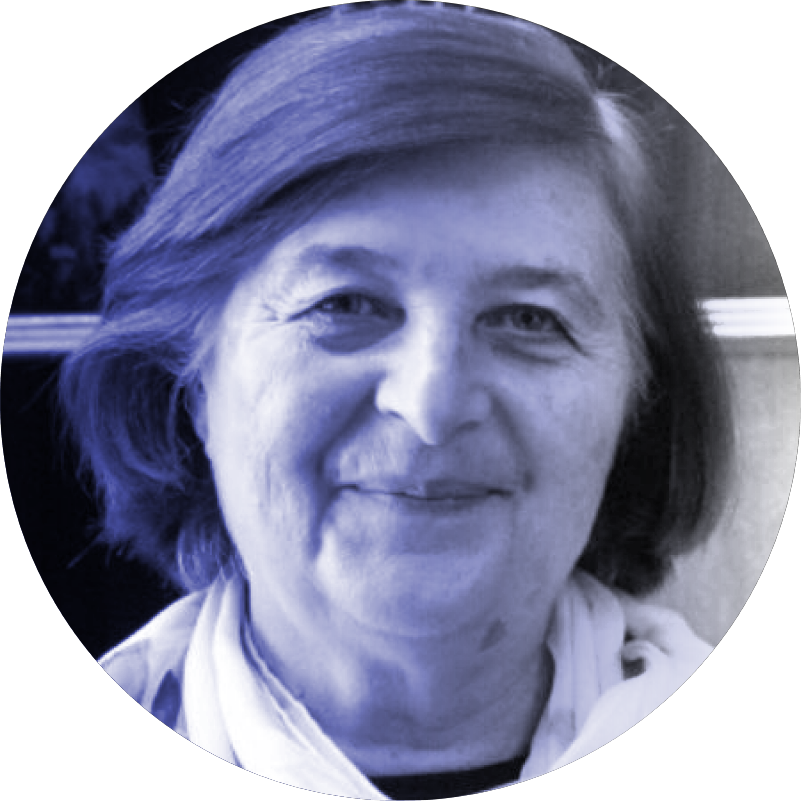
Helena Pereira
President of the Portuguese Foundation for Science and Technology (FCT), UT Austin Portugal's main sponsor.
Helena Pereira
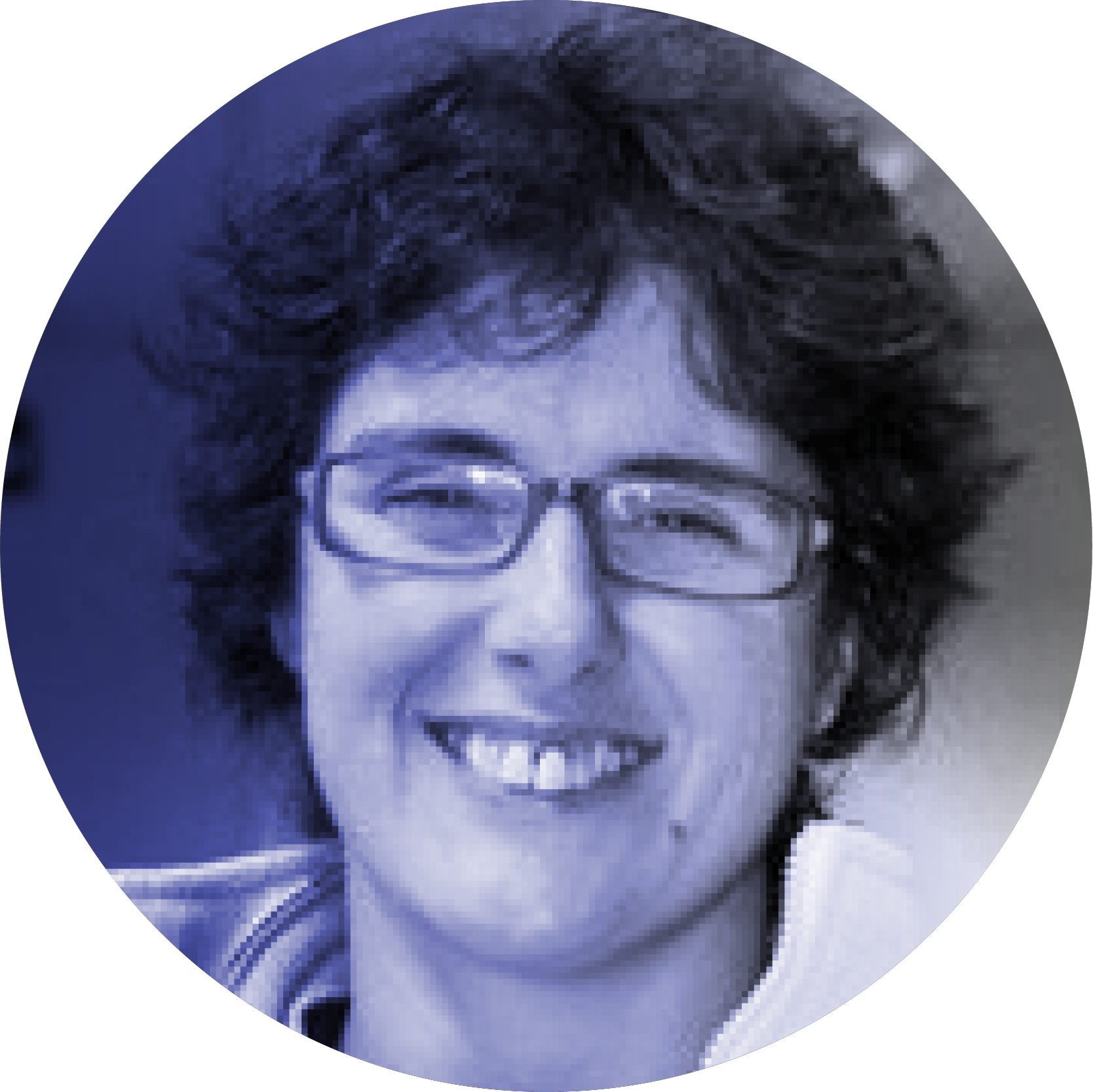
Ana Colaço
Ana Colaço is a deep-sea ecologist, specialized on hydrothermal vent ecosystems, the trophic ecology of deep-sea systems, benthic ecology, biodiversity, ecosystem functioning and conservation. The focus of her research has been the trophic ecology, ecosystem function of deep-sea habitats, especially hydrothermal vents and seamounts. She is engaged on the promotion and installation of Observatories in the deep-seafloor for the study of the marine environment and her ultimate interest is Conservation, more precisely the sustainable use of the deep-sea environment. Currently, Colaço wants to understand the functioning role of the Sponges, and the export or organic matter from vents and from the surface.
Ana Colaço
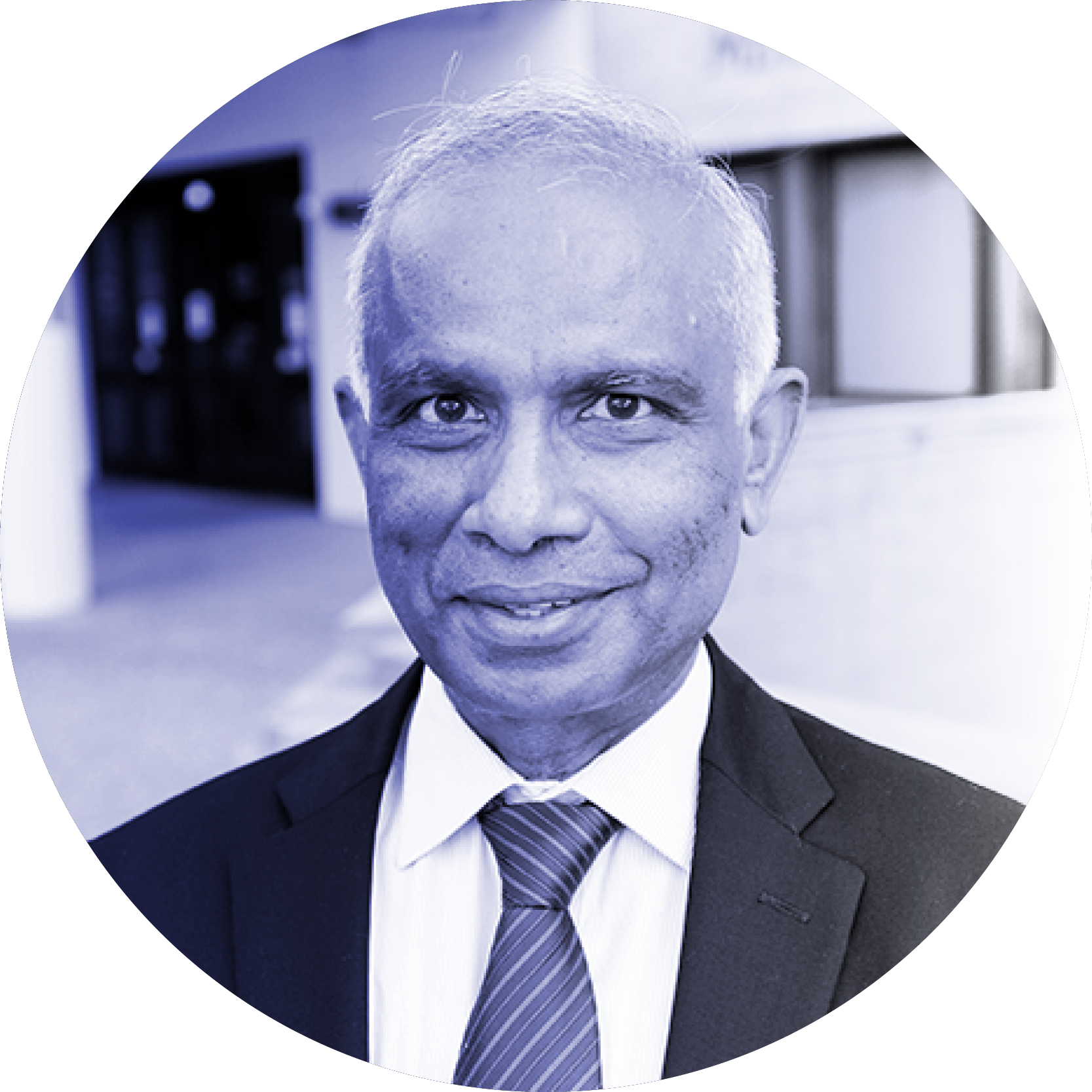
Arumugam Manthiram
Arumugam Manthiram graduated from Madurai University, India, with a B.S. degree in 1974 and a M. S. degree in 1976. He graduated from the Indian Institute of Technology Madras with a Ph.D. degree in Solid State Chemistry in 1980. Manthiram directs a research group in electrochemical energy technologies with about 30 graduate students and postdoctoral researchers. His current research is focused on rechargeable batteries and fuel cells. Specifically, his group is engaged in developing low-cost, efficient, durable materials for batteries and fuel cells and a fundamental understanding of their structure-property-performance relationships.
Arumugam Manthiram

Bruce Howe
Bruce Howe develops ocean observing infrastructure for the provision of power, communications, and positioning throughout the ocean volume, with an emphasis on cabled and acoustic systems. As Chair of the international Joint Task Force SMART Cable initiative, Howe is leading the effort to incorporate sensors into commercial trans-ocean submarine telecommunication cable systems to form a planetary scale observing system for climate, ocean circulation and sea level monitoring and tsunami and earthquake warning. After obtaining engineering and oceanography degrees at Stanford University and the University of California at San Diego, he has worked at the Applied Physics Laboratory, University of Washington, and since 2008, at the University of Hawaii at Manoa, Department of Ocean and Resources Engineering.
Bruce Howe

Catarina Carvalho
UT Austin Portugal's Head of Communication
Catarina is a staff member of INESC TEC's Communication Service since 2016. Before that, she was responsible for the Public Relations and Communication Office of Universidade Católica Portuguesa – Braga Regional Centre. Catarina has a Master’s degree in Communication Sciences – Advertising and Public Relations, in addition to her core graduation in Social Communication, with a specialization in Public Relations, and a post-graduate course in Marketing Management.
Catarina Carvalho
UT Austin Portugal's Head of Communication
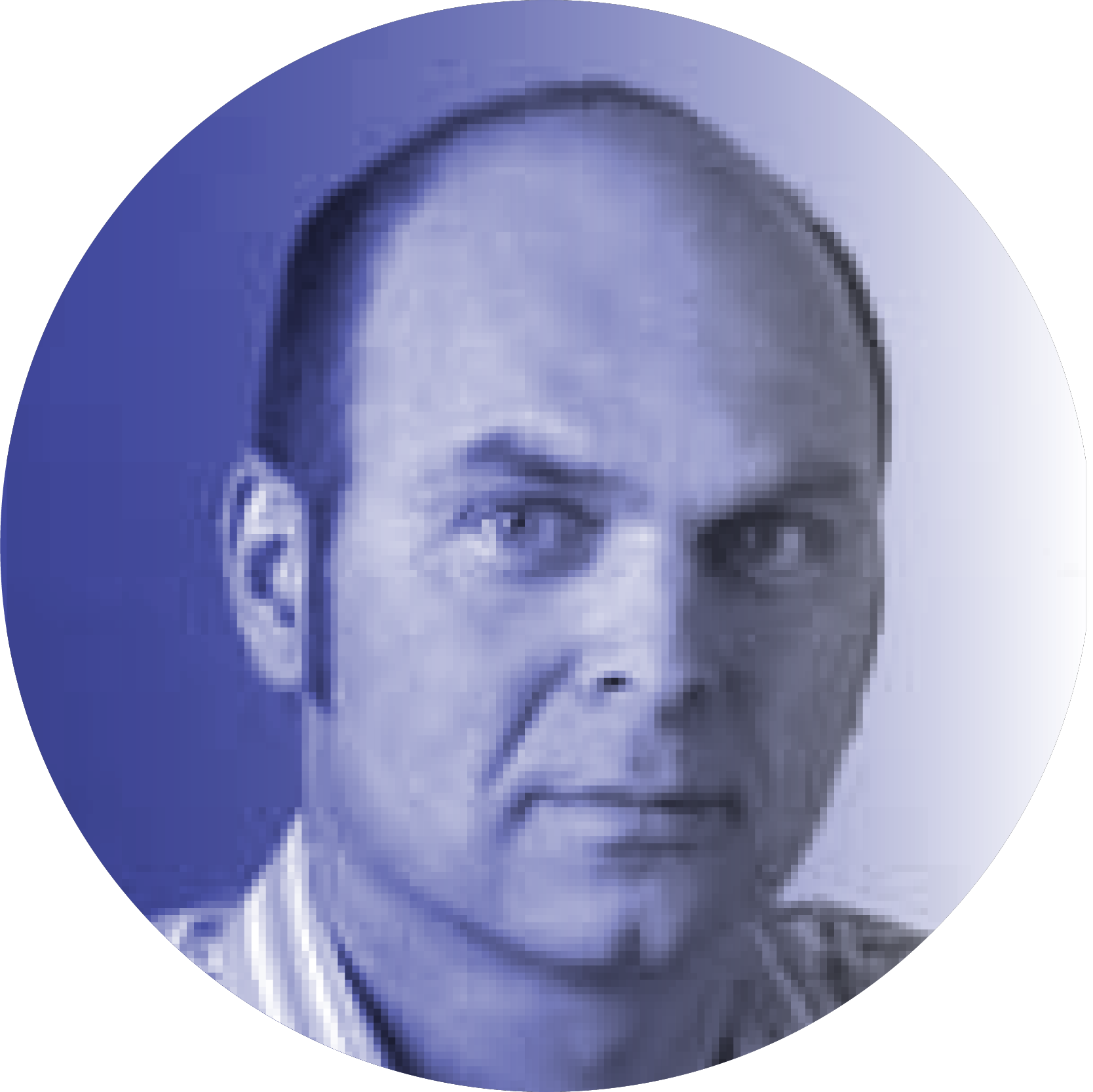
Félix Janssen
Felix Janssen scientific background is in organic matter remineralization in permeable shelf sediments with a focus on the role of pore water exchange. Currently his main interests are in the field of ocean observation to address global change effects on ecosystem function with emphasis on benthic biogeochemistry. Working at the Alfred Wegener Institute | Helmholtz Centre for Polar and Marine Research, a lot of his work focuses on project management and coordination tasks in support of scientific excellence. In addition, Janssen has a strong interest in the development and application of in situ instruments to address pore water and solute fluxes at the sediment-water interface.
Félix Janssen
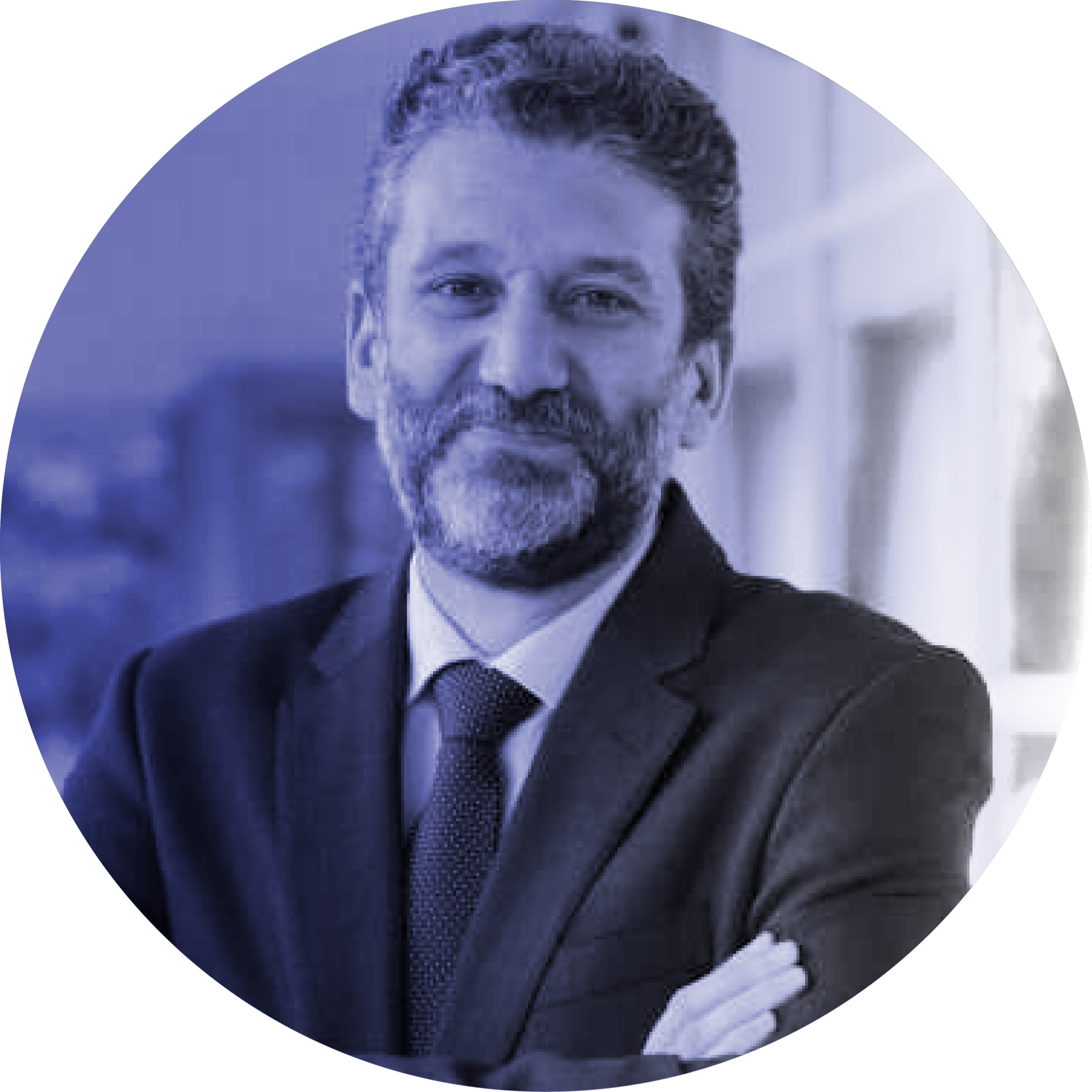
João Claro
UT Austin Portugal’s Area Director for Technology Innovation and Entrepreneurship (PT)
João Claro is Chief Executive Officer of INESC TEC and Associate Professor of Industrial Engineering and Management at the Faculty of Engineering of University of Porto (FEUP). He is a member of the Academic Council of Porto Business School (PBS), where he heads the Entrepreneurship and Innovation academic area. João holds a Ph.D. in Electrical and Computer Engineering from FEUP and an MSc in Quantitative Methods in Management from PBS.
João Claro
UT Austin Portugal’s Area Director for Technology Innovation and Entrepreneurship (PT)
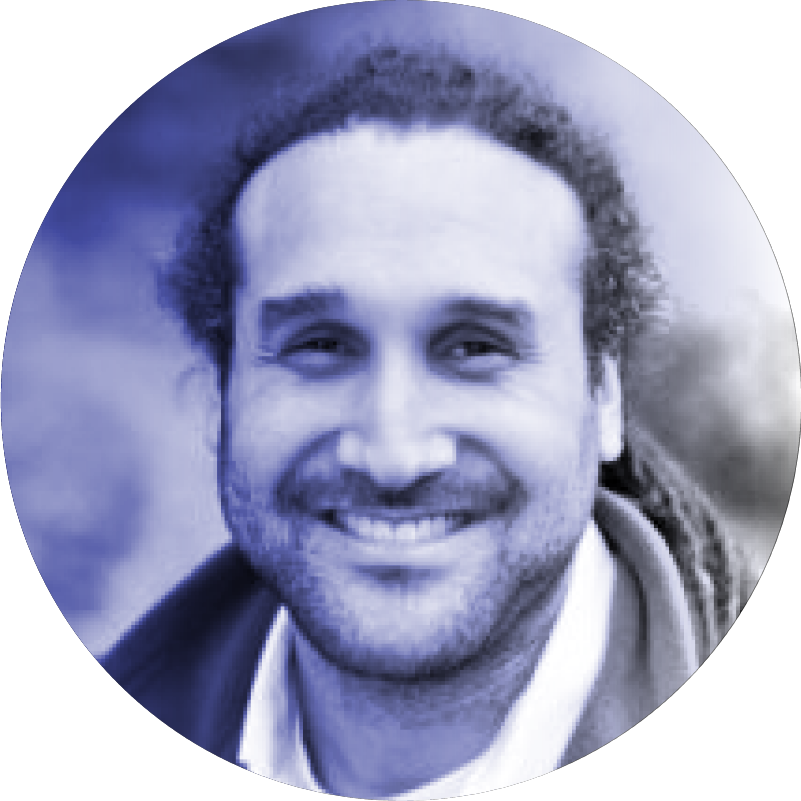
John D. Davis
John D. Davis is the Director of the Laboratory for Open Computer Architecture at the Barcelona Supercomputing Center. He has published over 30 refereed conference and journal papers in Computer Architecture, Distributed Systems, and Bioinformatics. He also holds over 35 issued or pending patents in the USA and Europe. John holds a Ph.D. in Electrical Engineering from Stanford University and also leads several industrial research collaborations, all centered around a full open-source ecosystem from software down to hardware, open-source processors, and accelerators. He is the founder and chair of the RISC-V Special Interest Group on High Performance Computing (SIG-HPC).
John D. Davis

José Manuel Mendonça
UT Austin Portugal's Director (PT)
José Manuel Mendonça is a Professor at the School of Engineering of the University of Porto, and Chairman of the Board and CEO of INESC TEC. José Manuel Mendonça graduated in Electrical Engineering at the School of Engineering, University of Porto, and obtained his Ph.D. in Electrical Engineering at the Imperial College of Science and Technology, University of London. Currently, he is also a Fellow of the IC2 Institute of the University of Texas, Austin, and a member of the High-Level Group of the European Technological Platform Manufacture.
José Manuel Mendonça
UT Austin Portugal's Director (PT)

Karol Lang
Karol Lang is an experimental particle physicist and the Jane and Roland Blumberg Professor of Physics at the University of Texas at Austin. Lang studies neutrino interactions and oscillations and investigates if neutrinos and antineutrinos represent the same fundamental field by searching for neutrinoless double beta decays. The Time-of-Flight PET for Proton Therapy UT-Portugal project is a spinoff of this research that includes building state-of-the-art particle detectors.
Karol Lang
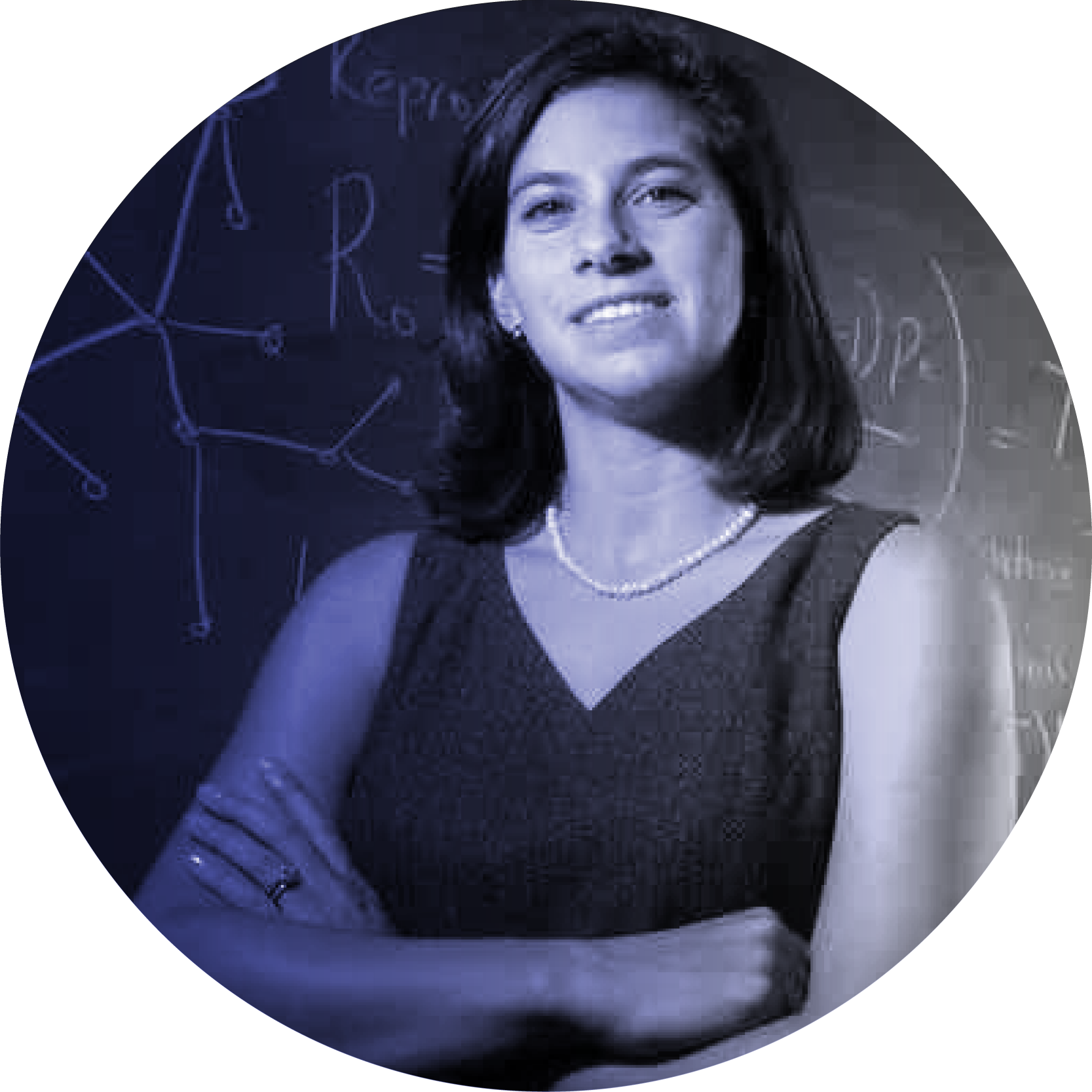
Lauren Meyers
Lauren Meyers is the Cooley Centennial Professor in biology and statistics at the University of Texas at Austin and Founding Director of the UT COVID-19 Modeling Consortium. She has been a pioneer agent in network epidemiology and the application of machine learning to improve detection, forecasting, and control of emerging viral threats. She received her MBA in mathematics and philosophy at Harvard University and Ph.D. in biology at Stanford University. She was named one of the top 100 global innovators under age 35 by the MIT Technology Review in 2004 and received the Joseph Lieberman Award for Significant Contributions to Science in 2017.
Lauren Meyers

Marco Bravo
UT Austin Portugal's Co-Principal Investigator and Executive Director (UT Austin)
Executive Director of the UT Austin Portugal Program and also the Executive Director of the National Science Foundation’s Southwest Innovation Corps (I-Corps) Node at the University of Texas at Austin. He is an Engineer with international experience and education, as well as leadership and managerial experience in the industry, in multinational businesses, consulting, academia, government, and startups. As an entrepreneur, Marco has co-founded three companies, a business angel fund, and actively mentored 200+ technology startups and entrepreneurs from multiple countries.
Marco Bravo
UT Austin Portugal's Co-Principal Investigator and Executive Director (UT Austin)

Miguel Coimbra
Miguel Coimbra is an Associate Professor at the Computer Science Department of the Faculty of Sciences of the University of Porto, coordinator of the TEC4Health of INESC TEC, member of the Executive Board of the Faculty of Sciences of the University of Porto, and Chair of the Portugal Chapter of the Institute of Electrical and Electronics Engineers and Medicine Society. Currently, he also leads and collaborates in numerous international projects in the areas of cardiology and gastroenterology.
Miguel Coimbra
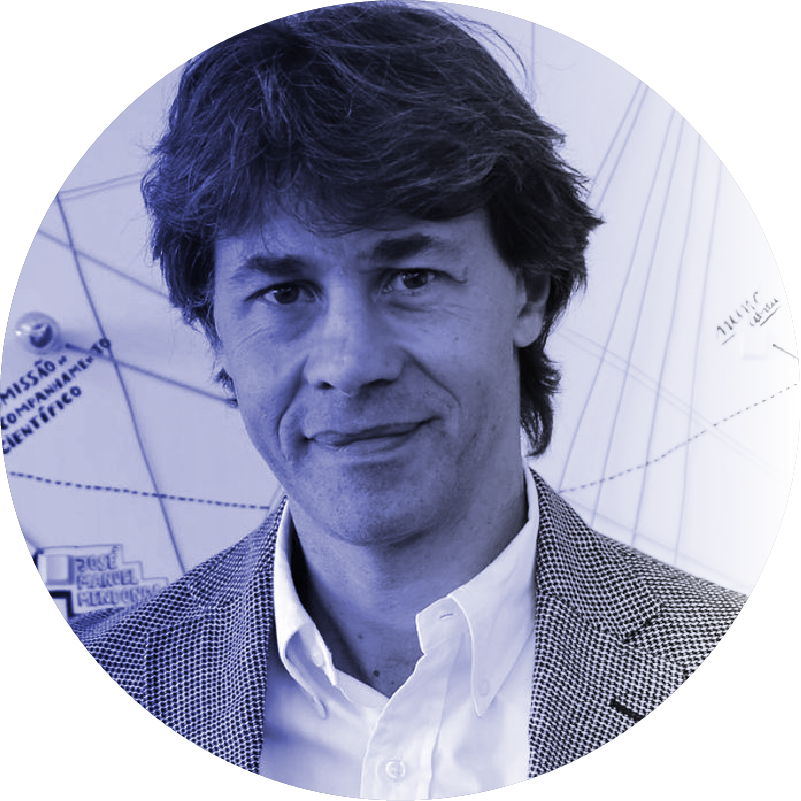
Paulo Ferreira
UT Austin Portugal’s Area Director for Nanotechnologies (PT)
Paulo Ferreira is the Head of the Department of Advanced Electron Microscopy, Imaging and Spectroscopy at the International Iberian Nanotechnology Laboratory. He is also a Full Professor in the Department of Mechanical Engineering at Instituto Superior Técnico, and an Adjunct Professor, Robert & Jane Mitchell Endowed Faculty Fellowship in Engineering in the Materials Science and Engineering Program at the University of Texas at Austin. He has a Ph.D. in Materials Science and Engineering from the University of Illinois and has done his Post-doctoral work at MIT in Materials Science and Engineering.
Paulo Ferreira
UT Austin Portugal’s Area Director for Nanotechnologies (PT)

Rui Oliveira
UT Austin Portugal’s Co-Director and Area Director for Advanced Computing (PT)
Rui Oliveira is an Associate Professor at the Informatics Department of the University of Minho, where he teaches Distributed Systems in undergraduate, master and doctoral courses. He is a member of the Board of Directors of INESC TEC, and the coordinator of the Minho Advanced Computing Center and National Contact Point to EuroHPC. He has been the director of the Computer Science and Technology Center (CCTC) from 2005 to 2010 and director of the High-Assurance Software Laboratory (HASLab), a research unit of the University of Minho and INESC TEC, from 2010 to 2015.
Rui Oliveira
UT Austin Portugal’s Co-Director and Area Director for Advanced Computing (PT)
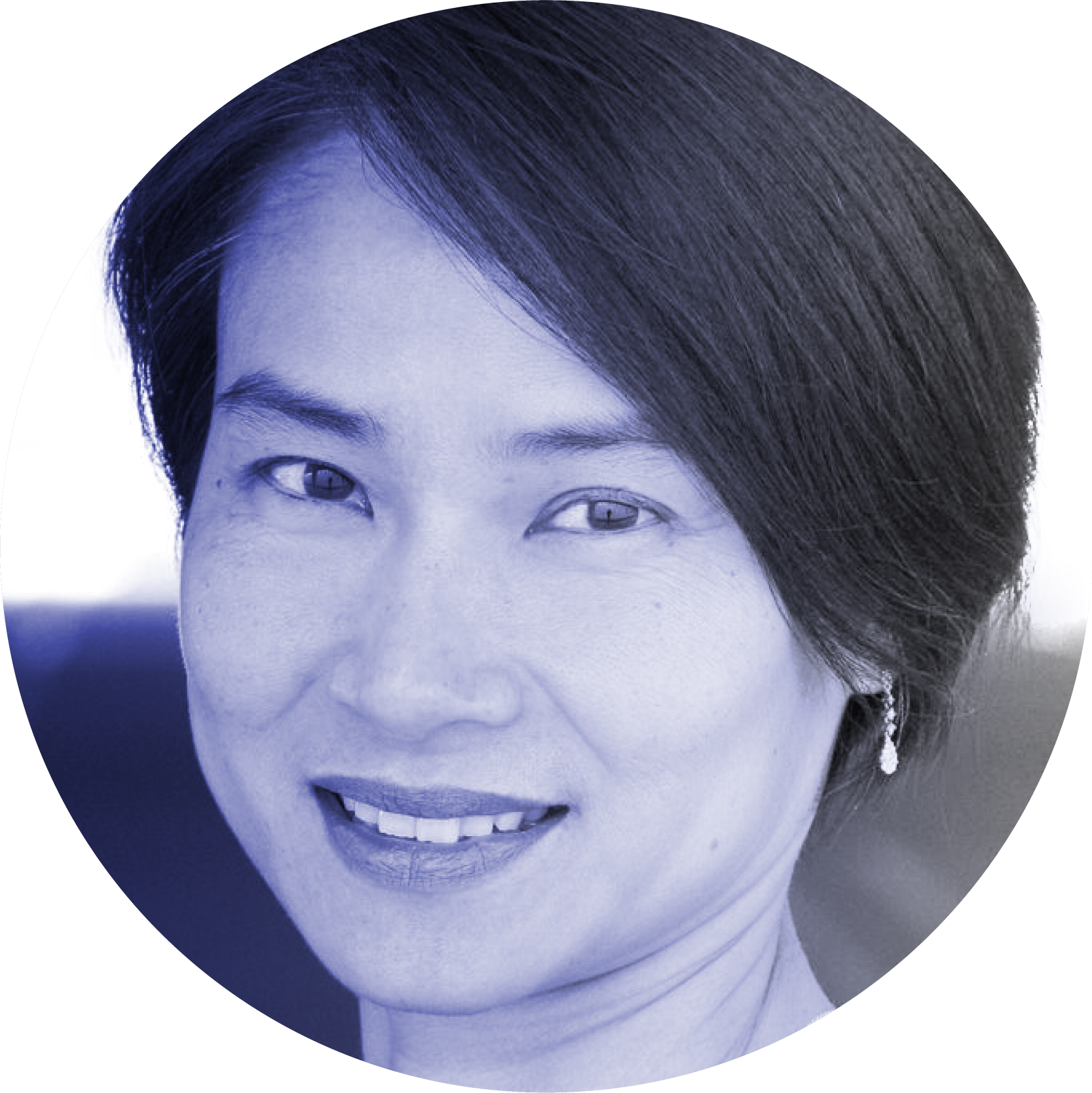
Van Truskett
Van Truskett is the Director of Technology Innovation Development at the University of Texas at Austin in the Office of Technology Commercialization. She has expertise in the areas of innovation and entrepreneurship, with results recognized in the nanoimprint lithography industry, leveraging university-based discoveries and startups for success. She played a key role in a team that raised $150m in venture capital and founded Molecular Imprints, a successful startup that was acquired by Canon, which formed Canon Nanotechnologies. She received her Ph.D. from the Johns Hopkins University and her BS from the University of Texas at Austin, both in Chemical Engineering.
Van Truskett

João Falcão e Cunha
Director and Full Professor of the Faculty of Engineering of the University of Porto (FEUP). Graduated in Electrical Engineering, João has a MSc. in Operational Investigation from the University of Cranfield and a PhD. in Computation Sciences from the Imperial College London in 1989. For the past 20 years, he has been involved in experimental and theoretical work in Computer Engineering and Information Systems.
João Falcão e Cunha
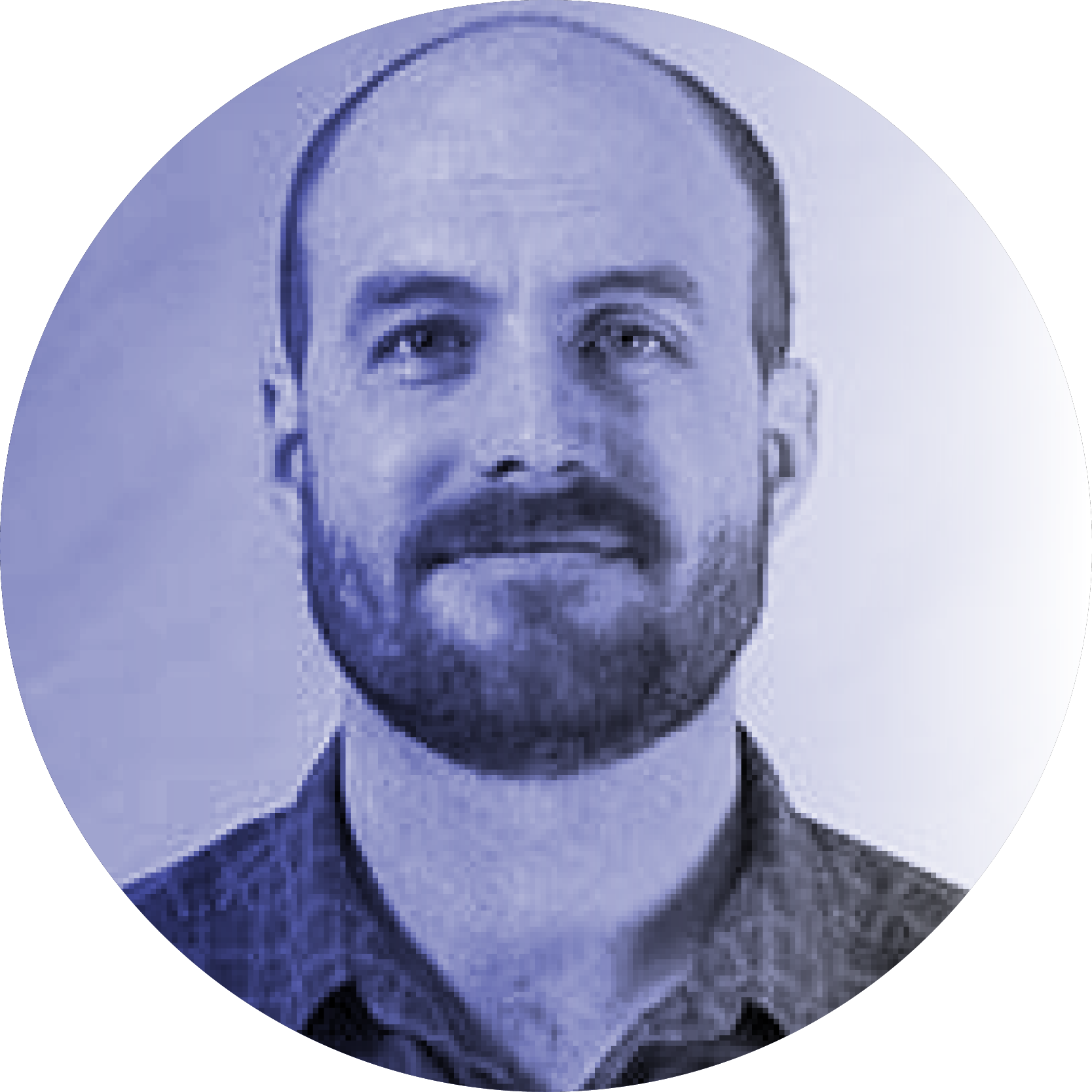
Andrew Thurber
Andrew Thurber is an Associate Professor in the College of Earth, Ocean, and Atmospheric Sciences and in the Department of Microbiology, College of Science at Oregon State University. His research focuses on deep-sea and polar soft-sediment habitats, looking at the trophic linkages between microbes and metazoans in marine habitats and how that impacts ecosystem function. He has a B.S. in Marine Biology from the Hawaii Pacific University, a M.Sc. in Marine Science from the California State University Stanislaus and a Ph.D. in Oceanography from UC San Diego.
Andrew Thurber

Brian Korgel
UT Austin Portugal’s Area Director for Nanotechnologies (UT Austin)
Brian A. Korgel is the Edward S. Hyman Chair in Engineering and T. Brockett Hudson Professor of Chemical Engineering at the University of Texas at Austin. He directs the Industry/University Research Center for Next Generation Photovoltaics and is Education Director for the UT Austin Materials Research Science and Engineering Center. He is also an Associate Editor of Chemistry of Materials. Brian A. Korgel will be the next director of the Energy Institute at the University of Texas at Austin, effective September 1, 2021.
Brian Korgel
UT Austin Portugal’s Area Director for Nanotechnologies (UT Austin)

Bruno Figueiredo
Bruno Figueiredo is the COO and Head of R&D at Graphenest and holds a Ph.D in Chemical Engineering from the University of Aveiro, Portugal. An expert in graphene, he was elected as a member of the 2017 Industry class at Forbes 30 under 30. His main research interests are related to the synthesis and characterization of known and novel materials and their commercial applications.
Bruno Figueiredo

Cátia Pedro
Cátia Pedro is a Radiation Oncologist at IPO Lisbon, where she also did her residency. During her residency, she had the opportunity to do an externship in Aarhus University Hospital, in Denmark, where a proton center was recently opened. At the moment, she continues to work in IPO, focused mainly in brain, pediatric and gastrointestinal tumors.
Cátia Pedro
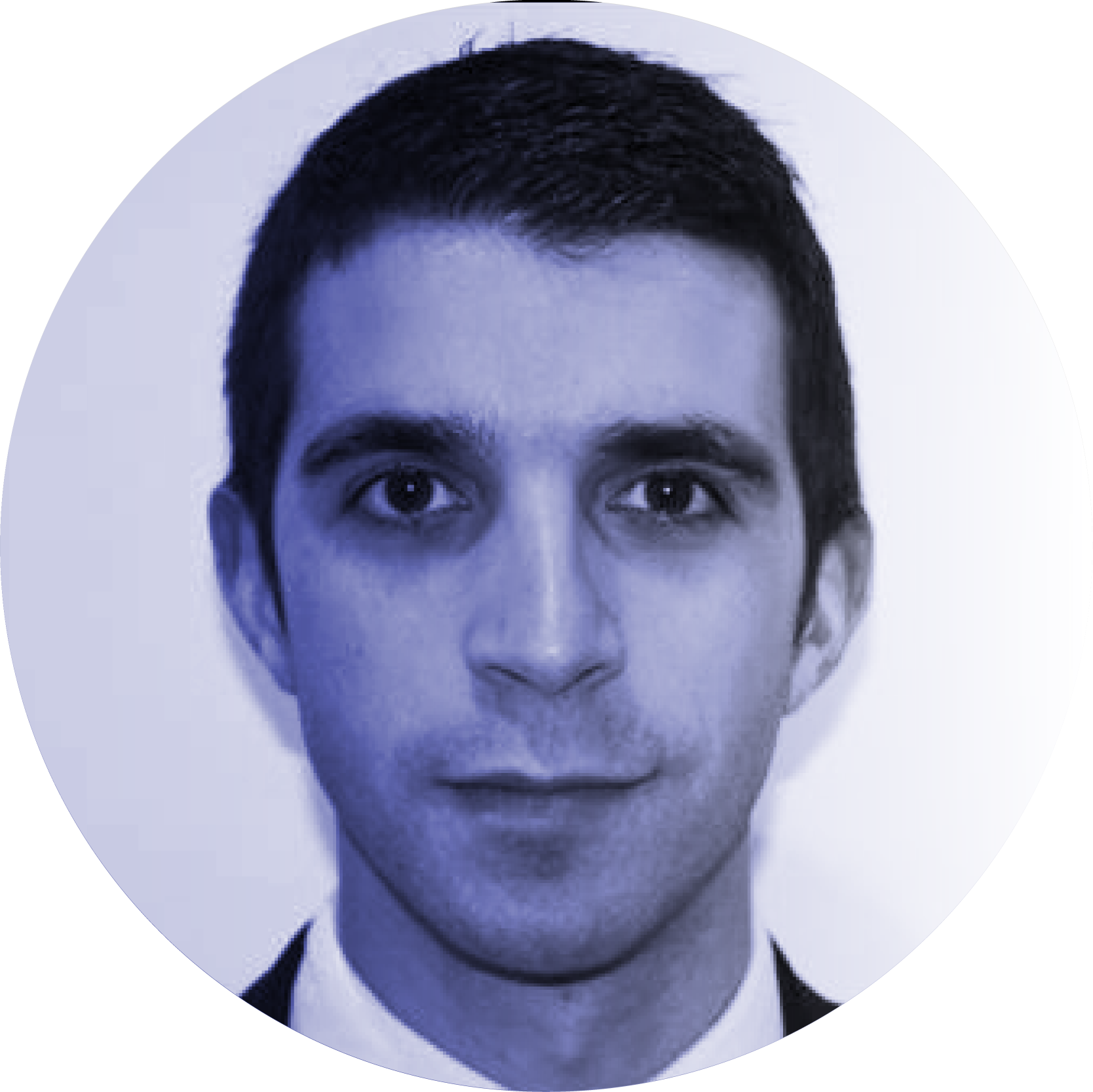
Filipe Fernandes
Filipe Fernandes is a PostDoc researcher fellow at the University of Minho and Invited Auxiliary Professor at the University of Coimbra (UC). He received his Ph.D. degree in mechanical engineering in 2014 from UC with industrial support, thereby gaining a large experience in the design of new materials and manufacturing processes for thin films. He is the PI of UT Austin Portugal’s project MCTool21 at UC and also a Marie Curie fellow at the Advanced Materials Group (AMG) of the Czech Technical University in Prague. His research interests include hardfacing coatings, thin solid films, thermal spraying coats, oxidation resistance, self-lubrication, and wear resistance coatings suitable for high-temperature applications.
Filipe Fernandes

João Oliveira
UT Austin Portugal’s Area Director for Medical Physics (PT)
João Oliveira is the President of the Board of Directors of IPO Lisboa and of the Board of Directors of Grupo Hospitalar Instituto Português de Oncologia Francisco Gentil. He developed his professional career at IPO Lisboa, where he was a member of the Board of Directors and clinical director since 2012. With a degree in Medicine, he has a Senior Management course in Health Units Management, is a specialist in Clinical Hematology and Medical Oncology and a member of several national and European organizations for the evaluation and research in the clinical and medical fields.
João Oliveira
UT Austin Portugal’s Area Director for Medical Physics (PT)
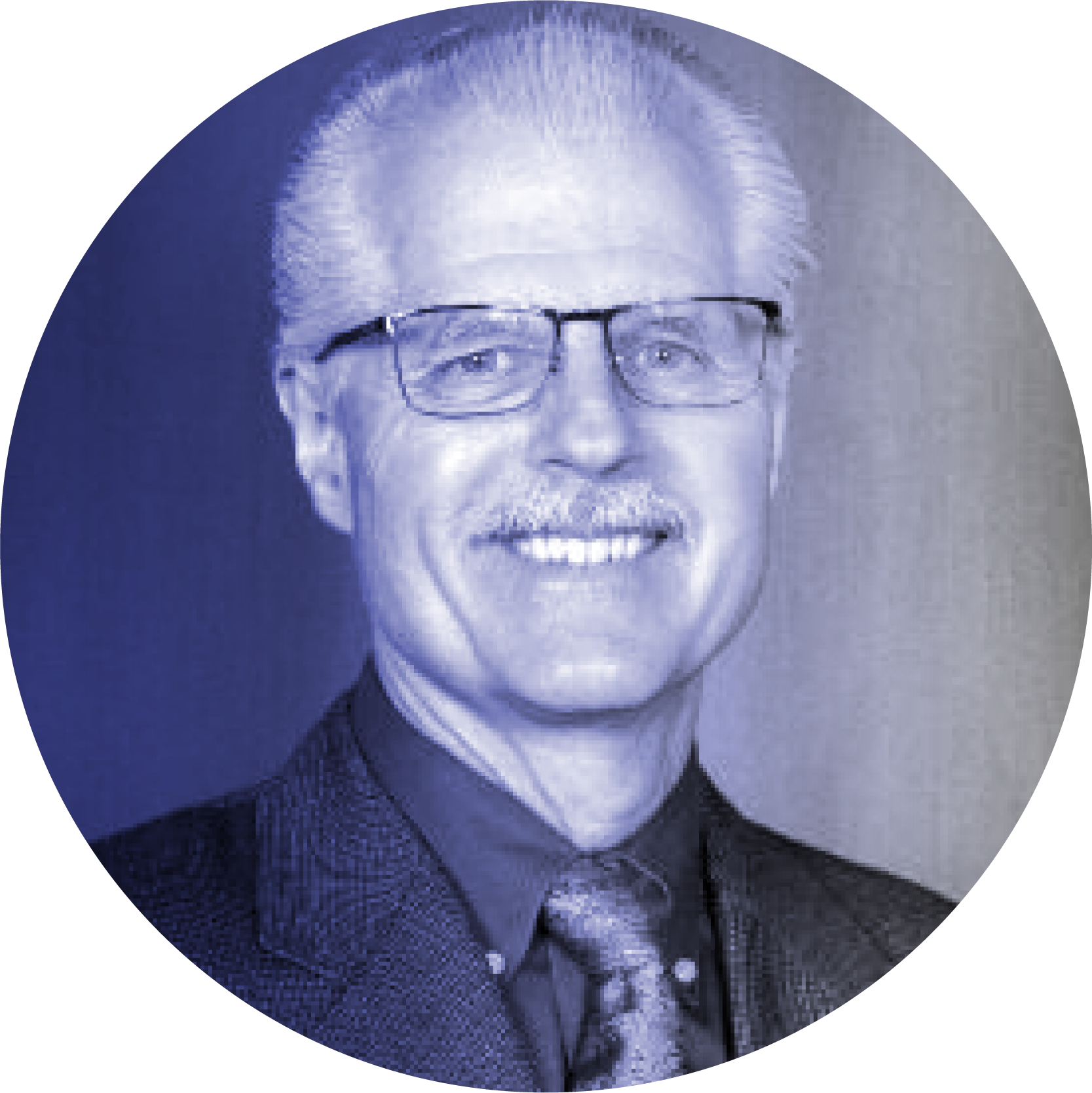
John Ekerdt
UT Austin Portugal's Principal Investigador (UT Austin)
John G. Ekerdt is the Associate Dean for Research in Engineering and the Dick Rothwell Endowed Chair in Chemical Engineering at the University of Texas at Austin. Using chemical and kinetic probes to unravel reaction pathways, mechanisms and reaction rates, his research has explored: 1) kinetics of single crystal, nanoparticle and ultrathin film growth, 2) chemistry that controls film and nanoparticle nucleation on surfaces and 3) relationships between precursor molecular structure, its reactivity and the properties of the electronic material that is grown. Current research interests focus on the surface, growth and materials chemistry of metal, dielectric and perovskite films and nanostructures.
John Ekerdt
UT Austin Portugal's Principal Investigador (UT Austin)
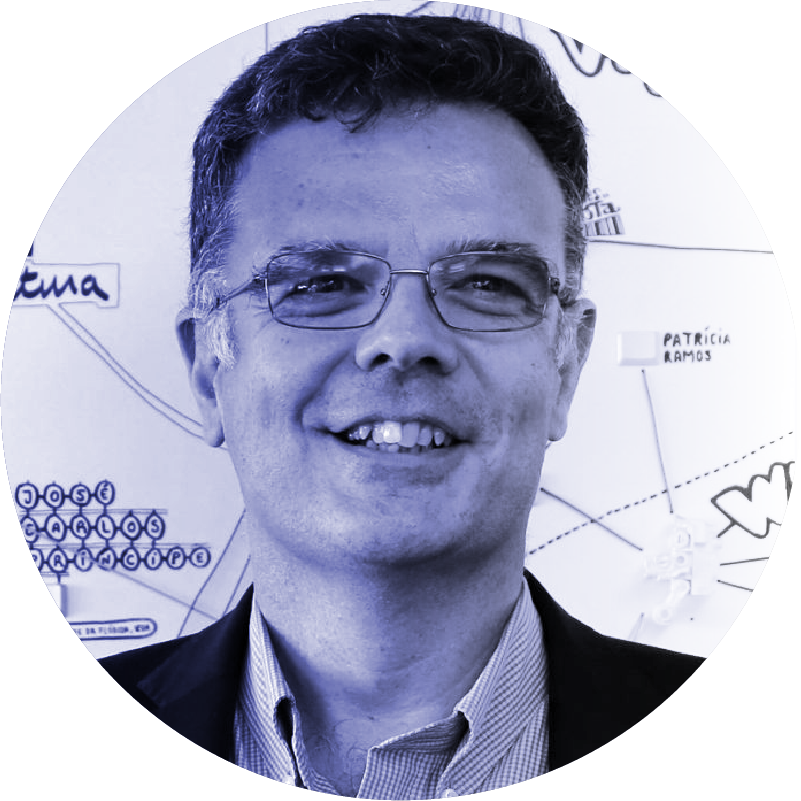
José Marques
UT Austin Portugal’s Area Director for Medical Physics (PT)
José Marques is Vice-President of the Campus Tecnológico e Nuclear at Técnico Lisboa, as well as a Coordinating Researcher, and a member of the Management Board, in charge of the Nuclear and Technological Campus. He obtained a Ph.D. from the University of Lisbon in 1996, after a BSc and an MSc in Physics from the same university. He has been an active participant in the working group created in 2017 to establish proton therapy in Portugal.
José Marques
UT Austin Portugal’s Area Director for Medical Physics (PT)

Lars Montelius
Lars Montelius is the Director-General of the International Iberian Nanotechnology Laboratory (INL) and Professor of Nanotechnology at Lund University in Sweden. He is also President of the International Union for Vacuum Science, Technique and Applications and Board member and Working Group Chair of two European Technology Platforms NANOFutures and EuMat. Additionally, he is the founder of several Swedish companies operating in the Nanotechnology field.
Lars Montelius
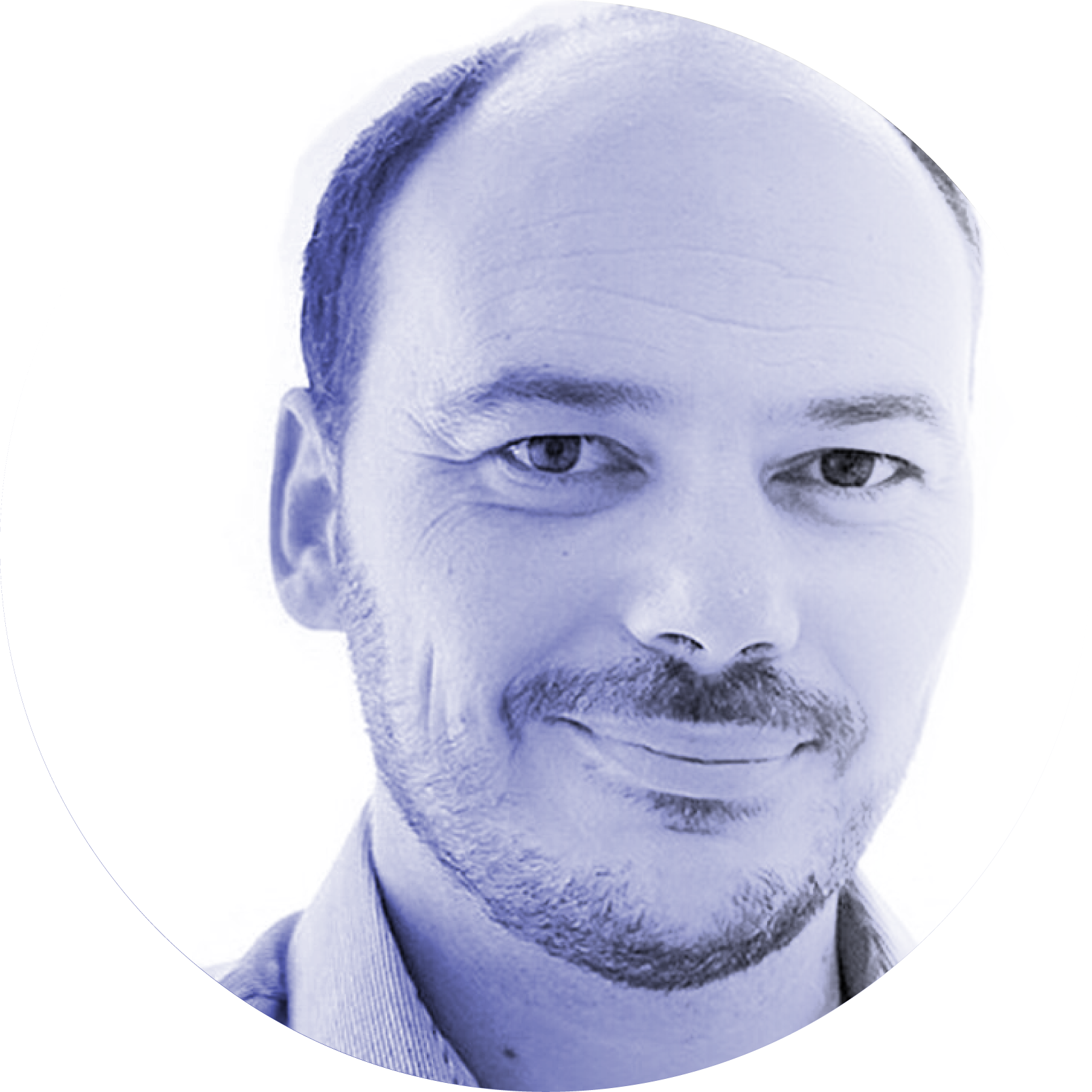
Luís Graça
Principal Investigator at Instituto de Medicina Molecular João Lobo Antunes (IMM) and full Professor at the University of Lisbon Medical School, Luís Graça leads the Cellular Immunology Lab at IMM and studies mechanisms that help to regulate antibodies' production and that can induce and maintain immune tolerance.
Luís Graça

Maria Helena Braga
Maria Helena Braga is an Associate Professor and the Head of the Engineering Physics Department of the University of Porto. She has a degree on Solid State Physics and Materials Science and a PhD on Materials and Metallurgy Engineering. From 2008-2011 she worked as a Research Scholar and Long-Term Staff Member at Los Alamos National Laboratory, US, where she firstly started working on crystalline solid-state electrolytes. In 2014, she discovered a Li- and Na- based glass-electrolyte that would lead her to collaborate with Prof. John B. Goodenough from 2016 to 2019 as a Senior Research Fellow at UT-Austin.
Maria Helena Braga
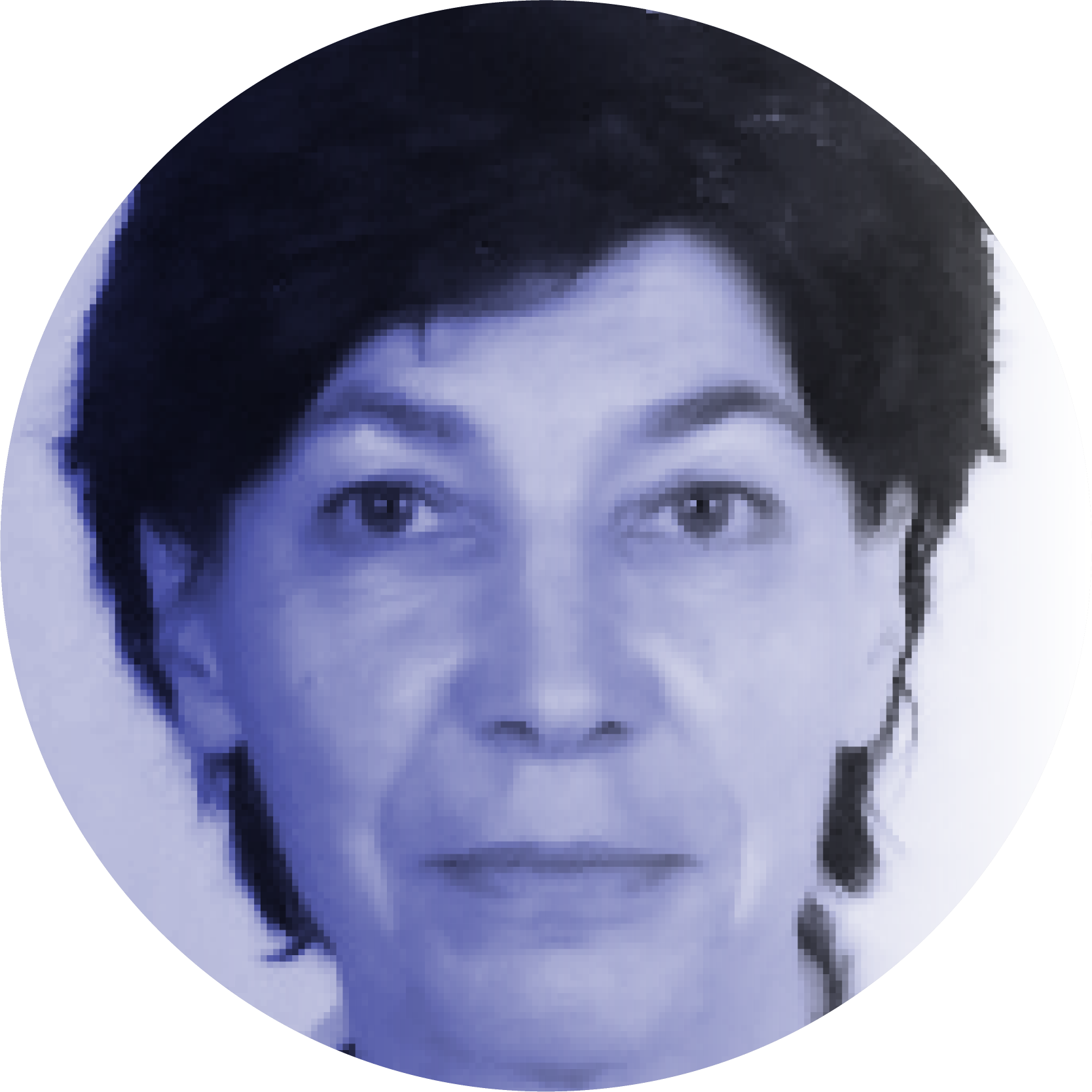
Mireille Paulin
Mireille Paulin is an Engineer at the Center National d'Etudes Spatiales (CNES). She has coordinated CNES's participation in the Committee on Earth Observation Satellites (CEOS) and was the Project Manager of the PEPS project (French Platform for the distribution of Sentinel satellites products). In 2021, Mireille joined the Earth Observation department as the Health and Forest Program Manager. She is working in close collaboration with the French scientific community and is currently supporting the development of tele-epidemiology.
Mireille Paulin
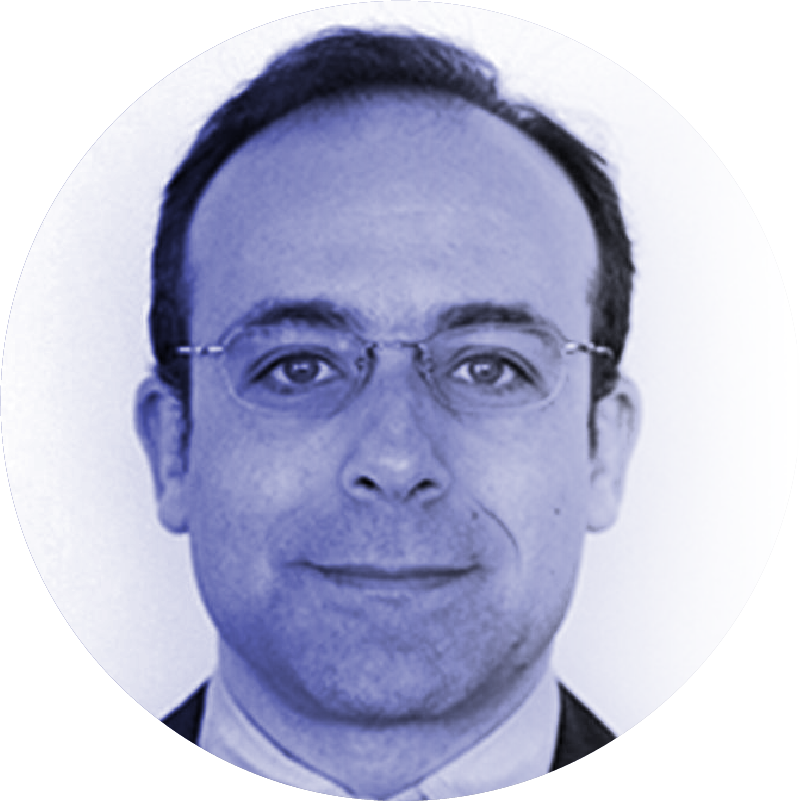
Pedro Camanho
UT Austin Portugal’s Area Director for Space-Earth Interactions (PT)
Pedro Camanho received his Ph.D. in Composite Materials from the Department of Aeronautics of the Imperial College London. He is a Professor at the Department of Mechanical Engineering of the Faculty of Engineering of the University of Porto, Vice-President of the Institute of Mechanical Engineering and Industrial Management, and President of the Associated Laboratory in Energy, Transportation, and Aeronautics. Pedro is also a researcher and member of the Advisory Board of the European Mechanics Society, of the Council of the European Society for Composite Materials, and the Engineering Panel of the European Research Council.
Pedro Camanho
UT Austin Portugal’s Area Director for Space-Earth Interactions (PT)

Rui Sousa
Rui Sousa is the CEO of Stemmatters, a Portuguese biotechnology company operating in cell-based, tissue, and blood-derived therapeutic products. He holds a Ph.D. in Mechanical Engineering and an MSc in Business Administration. Sousa's work focuses on regenerative medicine and tissue engineering, with a scientific production exceeding 70 papers in scientific journals.
Rui Sousa
